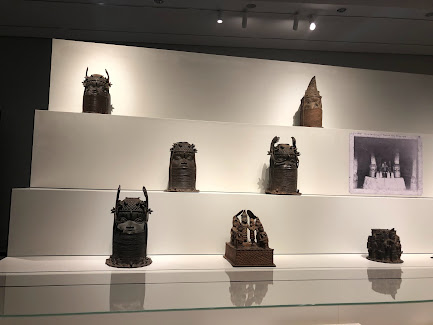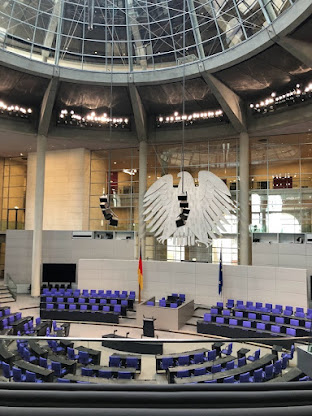Blocker Blog - Entry 3: The Humboldt Forum
The Humboldt Forum upon first
impressions for me was a new type of museum institution in comparison to other
museums that I have been to. Upon its many controversies I have built an
increasingly critical view of the Forum in a way that helps me create a type of
ideal space where reflection and action that can be done in a museum setting,
particularly in a setting that holds various archeological artifacts. Now, the
Humboldt Forum in a broader sense holds space for conversations that are other
than just acknowledging colonial and imperial history that I also enjoy to see.
For context, the Humboldt Forum
hosts different exhibitions that have different categories of items that ranges
from the sciences to the humanities and the arts in its different levels. A particular
space that really holds the space to start deep conversations about various topics
is the Humboldt Lab. The Humboldt Lab, located on the first floor is a 1,000+
square space where, in partnership with Humboldt-Universität, has ever changing exhibitions
about scientific topics that the public is able to interact with and have a
deep conversation about the topic. Although I myself have not been to the Humboldt
lab so far, its existence does give me a scope as to how the Forum overall
starts and facilitates conversations about the many topics around living on Earth
whilst educating the public on various subjects for context and background. On
a first glance, this reminds me on the multiple science museums in the US that have
interactive and conversational spaces for people to have to talk about certain
subject; though they are very much as means of educating but not really encouraging
further thought as to how different scientific advances can deeply affect other
aspects of life, with there also being an undertone for having these spaces
mainly for children that could align with current educational curricula. The
Forum just gives me the energy that it wants to take conversations even further
for anyone to part take.
As for the cultural artefacts that are located on the second and
third floors of the Forum, one of my critiques as to how the institution have conversations
about historical acknowledgement and even accountability, is how selective they
are about certain artefacts as means to bring attention to them for eventual
restitution and repatriation. A prominent example would be the Benin Bronzes and
their recent notoriety regarding their repatriation to their region of origin. The
bronze sculptures are from the Kingdom of Benin, which is located in the modern
country of Nigeria in West Africa. Although Germany did not colonize this
region of West Africa, in them being in the discussion of historical
acknowledgement and accountability, is very much needed. However, what its
important to realize is that these artefacts were looted by the British which was
the largest colonial power in Africa. In dedicating the time and effort of
having these pieces having space for conversation, I believe that it deviates
energy from talking about other objects that Germany directly looted and stole
during its colonial period: places such as Namibia, Cameroon, Papua New Guinea,
various Polynesian islands. Although I appreciate the Forum talking about and
taking action with returning the Benin Bronzes to Nigeria, the British Museum should
bring attention to that (despite the fact that the Forum is one the first
places in Europe that emphasizes a type historical accountability) while the
Forum could focus on the Mandu Yenu throne or the multiple South Sea boats.
Overall, in the way that the Forum practices its agenda towards
acknowledgement and restitution I see it as being in many ways a first in a museum
setting, which the more I think about it is something that is late income and
slow to show in every institution. The tangible legacy of colonialism is
something that still heavily lingers and affects the way that people have access
to objects that tell a history of a certain peoples and I hope to explore that
further through logistical analysis of the Forum and nitpicking every once in a
while.







Comments
Post a Comment